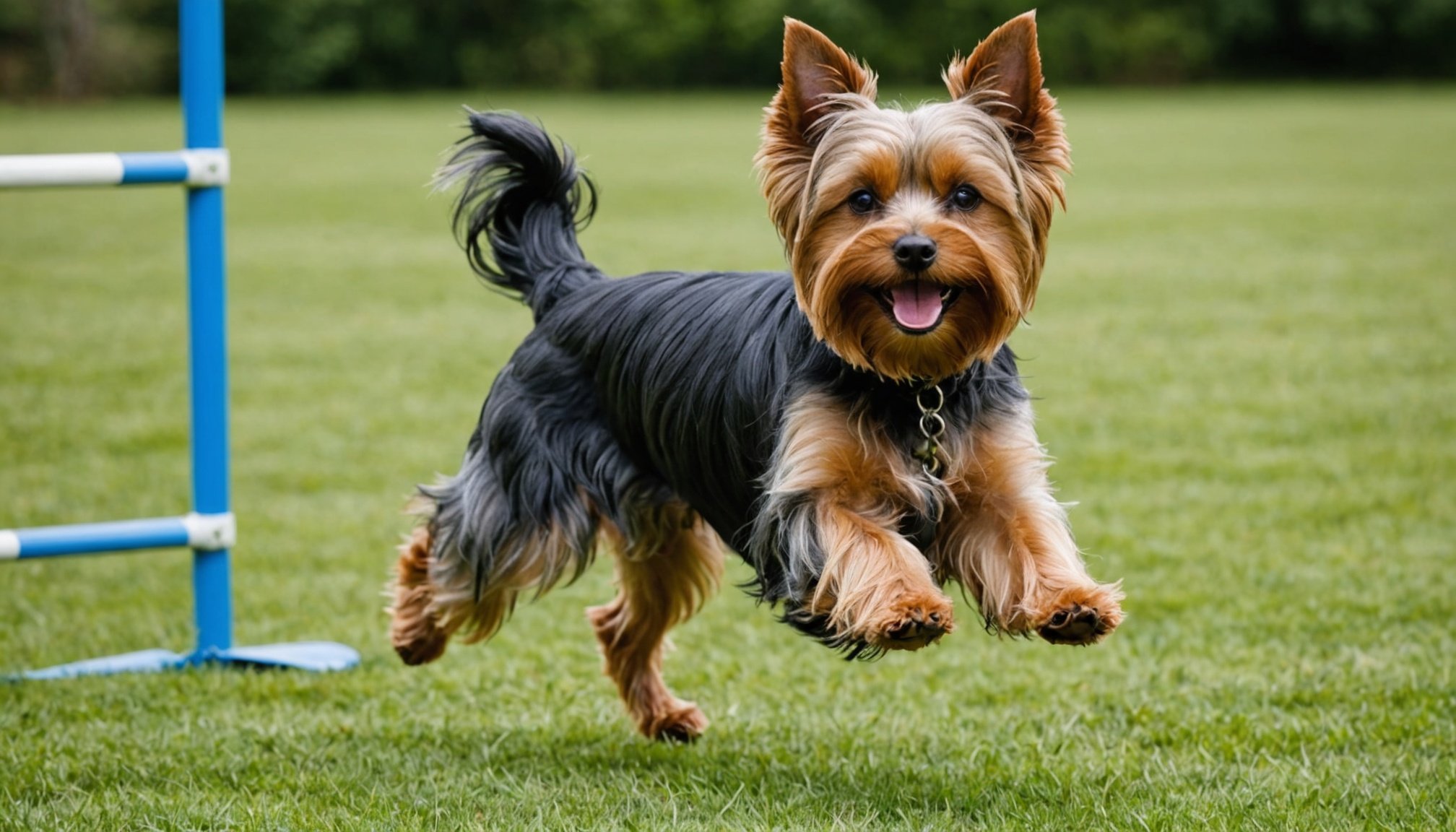Agility training can do wonders for your Yorkshire Terrier’s health and well-being. This engaging activity not only enhances physical fitness but also strengthens the bond between you and your furry friend. Discover how agility training boosts mental stimulation, promotes weight management, and fosters better behavior. With long-term benefits that extend far beyond the course, your Yorkshire can thrive in a playful, structured environment. Explore how incorporating agility training into your routine can lead to a happier, healthier lifestyle for both you and your beloved pet.
Understanding Agility Training for Yorkshire Terriers
Agility training offers a dynamic and engaging way to provide exercise for dogs, especially for breeds like Yorkshire Terriers. This type of training involves a series of obstacles, such as tunnels, jumps, and weave poles, designed to test a dog's speed, coordination, and obedience. For Yorkshire Terriers, agility training not only keeps them physically fit but also mentally stimulated, which is crucial for their overall well-being.
Sujet a lire : Mastering Litter Box Training: Are Ferrets Capable of Success?
Yorkshire Terriers, known for their energetic and spirited nature, require agility training that caters specifically to their unique characteristics. These small dogs are agile and quick, making them well-suited for such activities. However, given their size, it's important to ensure that the obstacles are appropriately scaled to avoid any strain or injury. The training should focus on exercises that enhance their natural agility while ensuring their safety.
Tailoring agility training to the specific needs of Yorkshire Terriers is essential. Their small stature means jumps should be lower, and courses should be designed to prevent overexertion. By customizing agility training, owners can ensure that their Yorkshire Terriers remain engaged and motivated, ultimately leading to a happier and healthier pet.
A découvrir également : Is Your Tropical Aquarium Ready for an Axolotl Companion? Essential Tips for Successful Co-Habitation!
Physical Health Benefits of Agility Training
Agility training offers numerous health benefits for Yorkshire Terriers, significantly impacting their physical fitness. Engaging in regular agility practice can markedly improve their cardiovascular health. This type of exercise involves running, jumping, and weaving, which are excellent for boosting heart health and increasing stamina. As Yorkshire Terriers navigate through agility courses, their heart rate elevates, promoting better circulation and overall cardiovascular function.
Additionally, agility training enhances muscle strength and endurance. The varied movements required during these exercises help build and tone muscles, particularly in the legs and core. This is crucial for Yorkshire Terriers, as strong muscles support their small frames and contribute to their agility.
Weight management is another critical benefit of agility training for Yorkshire Terriers. Regular physical activity helps prevent obesity, a common issue in small dog breeds. By maintaining a healthy weight, Yorkshire Terriers reduce the risk of developing obesity-related health problems, such as diabetes and joint issues.
Incorporating agility training into a Yorkshire Terrier's routine not only keeps them fit but also supports their overall health and longevity. This engaging form of exercise ensures they remain active, healthy, and happy companions.
Mental Stimulation and Cognitive Development
Agility training offers more than just physical benefits for Yorkshire Terriers; it provides significant mental stimulation. Engaging a dog's mind is crucial for their cognitive training and overall well-being. During agility exercises, Yorkshire Terriers must navigate through obstacles, which requires focus and quick thinking. This mental engagement helps sharpen their problem-solving skills, as they learn to anticipate and react to various challenges.
Cognitive development is further enhanced as they master new commands and techniques. The process of learning and executing these commands stimulates their brains, keeping them alert and mentally fit. This continuous learning environment is beneficial for Yorkshire Terriers, who thrive on mental challenges and enjoy the satisfaction of overcoming obstacles.
Moreover, agility training can lead to improved dog behavior. When Yorkshire Terriers are mentally engaged, they are less likely to develop behavioral issues such as excessive barking or destructive habits. The combination of physical and mental exercise helps channel their energy positively, reducing the likelihood of unwanted behaviors. By providing both mental and physical stimulation, agility training supports a balanced and healthy lifestyle for Yorkshire Terriers, promoting their cognitive growth and enhancing their overall quality of life.
Behavioural Improvements through Agility Training
Agility training plays a pivotal role in behavioural training for Yorkshire Terriers, significantly enhancing their social skills. This type of dog training involves structured activities that encourage positive interactions with both humans and other dogs. By participating in agility exercises, Yorkshire Terriers learn to navigate social settings more comfortably, improving their overall socialisation.
One notable benefit of agility training is the reduction of anxiety and stress-related behaviours. The structured environment and repetitive nature of agility courses provide a sense of security and predictability for these dogs. As they become more accustomed to the routine, anxiety levels decrease, leading to a calmer demeanour. This is particularly beneficial for Yorkshire Terriers, who can be prone to nervousness.
Moreover, agility training strengthens the bond between owner and pet. The collaborative nature of these exercises requires clear communication and trust, fostering a deeper connection. Owners can use various dog training techniques to guide their pets through the courses, reinforcing positive behaviours and building mutual understanding. This shared experience not only enhances the dog's behaviour but also enriches the relationship, creating a harmonious dynamic between owner and Yorkshire Terrier.
Training Techniques for Yorkshire Terriers
Training Yorkshire Terriers in dog agility involves specific steps and techniques to ensure success. To start, begin with basic obedience training to establish foundational commands like sit, stay, and come. This ensures your Yorkshire Terrier understands and responds to instructions, which is crucial when progressing to agility courses.
When introducing agility training, consider the appropriate equipment for small breeds. Recommended items include:
- Adjustable jumps
- Tunnels
- Weave poles
These tools are designed to accommodate the size and agility of Yorkshire Terriers, ensuring they remain safe and engaged.
Positive reinforcement plays a vital role in training. Reward your Terrier with treats or praise when they successfully complete a task. This encourages them to repeat the desired behaviour and builds their confidence. Consistent positive reinforcement fosters a supportive learning environment, making training enjoyable for both the dog and the owner.
Begin with simple exercises and gradually increase the complexity as your Terrier becomes more comfortable. Patience and persistence are key. By following these techniques, you can effectively train your Yorkshire Terrier in agility, enhancing their physical and mental abilities while strengthening the bond between you and your pet.
Safety Considerations in Agility Training
Ensuring dog safety during agility training is paramount, particularly for Yorkshire Terriers. These small dogs, while agile, are susceptible to injuries if proper precautions aren't taken. Common injuries include sprains and strains, often caused by improper landings or overexertion. To prevent these, it's crucial to scale obstacles appropriately and monitor your dog's movements closely.
Incorporating warm-up and cool-down exercises is essential for training safety. Begin each session with gentle exercises to prepare their muscles and joints, reducing the risk of injury. Similarly, cool-down activities help in gradually lowering their heart rate and preventing muscle stiffness. These routines are vital in maintaining the overall health and agility of Yorkshire Terriers.
Creating a safe training environment is another critical aspect of Yorkshire Terrier care. Ensure the training area is free of hazards and has a non-slip surface to prevent accidents. Supervision during training is also key; always keep an eye on your Terrier to intervene if they appear fatigued or stressed. By prioritising safety, you can provide a secure and enjoyable agility training experience for your Yorkshire Terrier.
Age-Appropriate Agility Activities
Adapting agility training to suit different life stages of Yorkshire Terriers is essential for their well-being. When considering puppy training, focus on gentle and low-impact age-appropriate exercises. Puppies are still developing, so activities should emphasize basic commands and coordination without overexertion. Short sessions with plenty of breaks ensure they remain engaged without becoming overwhelmed.
For senior dogs, agility training must be tailored to accommodate their reduced stamina and potential joint issues. Senior dog agility should incorporate exercises that maintain mobility while minimizing stress on their bodies. Activities like walking through tunnels or stepping over low bars can help keep them active without causing strain.
The importance of gradual progression in training intensity cannot be overstated. Regardless of age, Yorkshire Terriers benefit from a slow increase in challenge and complexity. This approach prevents injuries and builds confidence, allowing them to enjoy the benefits of agility training throughout their lives.
By adjusting agility activities to match the specific needs of puppies and senior dogs, owners ensure their Yorkshire Terriers remain healthy and motivated, fostering a lifelong love for exercise and learning.
Integrating Agility Training into Daily Routines
Incorporating agility training into your Yorkshire Terrier's daily routine can enhance their physical and mental well-being. Establishing a consistent exercise schedule is key to achieving this. Begin by setting aside specific times each day dedicated to agility exercises. This helps your Terrier anticipate and look forward to their training sessions, promoting a sense of routine and stability.
To create a balanced dog training plan, integrate agility training with other forms of exercise. For example, mix agility drills with walks or playtime to ensure a well-rounded physical activity regimen. This variety keeps your Terrier engaged and prevents boredom, while also targeting different muscle groups and skills.
Balancing training with rest and recovery periods is crucial for your Terrier's health. Ensure that your exercise schedule includes adequate downtime for your dog to recuperate. This prevents overexertion and reduces the risk of injury, allowing your Terrier to enjoy agility training safely and sustainably.
By thoughtfully integrating agility training into your Yorkshire Terrier's daily routine, you can foster a healthy, active lifestyle that supports their overall well-being and happiness.
Research and Expert Opinions on Long-Term Benefits
Agility training for Yorkshire Terriers is supported by numerous research studies and expert opinions highlighting its long-term health benefits. Studies consistently show that regular agility training significantly boosts cardiovascular health, muscle strength, and overall physical fitness in small dog breeds. This form of exercise not only helps maintain a healthy weight but also reduces the risk of obesity-related diseases, such as diabetes and joint problems.
Experts in canine behaviour and health emphasize the mental and physical advantages of agility training. Veterinarians and dog trainers alike advocate for its role in enhancing mental stimulation and improving dog behaviour. They note that Yorkshire Terriers engaging in agility exercises often exhibit fewer behavioural issues, such as anxiety or excessive barking.
The long-term health implications of agility training are profound. Research supports its role in promoting longevity and a higher quality of life for Yorkshire Terriers. By maintaining an active lifestyle, these dogs are less likely to experience age-related health issues, ensuring they remain vibrant and healthy well into their senior years.
In conclusion, both research studies and expert opinions affirm the enduring benefits of agility training, making it a highly recommended practice for Yorkshire Terrier owners.
Success Stories and Community Involvement
Engaging with the dog training community can be a transformative experience for Yorkshire Terrier owners. Many have shared inspiring success stories of how agility training has positively impacted their pets. For instance, one owner, Jane, noted how her once-shy Terrier blossomed into a confident competitor after joining a local agility club. These stories highlight the profound changes agility training can bring, not just in physical fitness, but also in boosting a dog's confidence and social skills.
Participation in agility competitions offers further opportunities for growth and achievement. These events provide a platform for showcasing skills and celebrating progress, fostering a sense of accomplishment for both dogs and their owners. Competing can strengthen the bond between owner and pet, as they work together towards a common goal.
The benefits of community support in the dog training journey are immense. Being part of a supportive group offers encouragement, advice, and shared experiences, making the training process more enjoyable and less daunting. Agility clubs often host workshops and events, providing continuous learning and development opportunities. Engaging with the community not only supports individual success but also enriches the overall training experience for Yorkshire Terriers and their owners.











